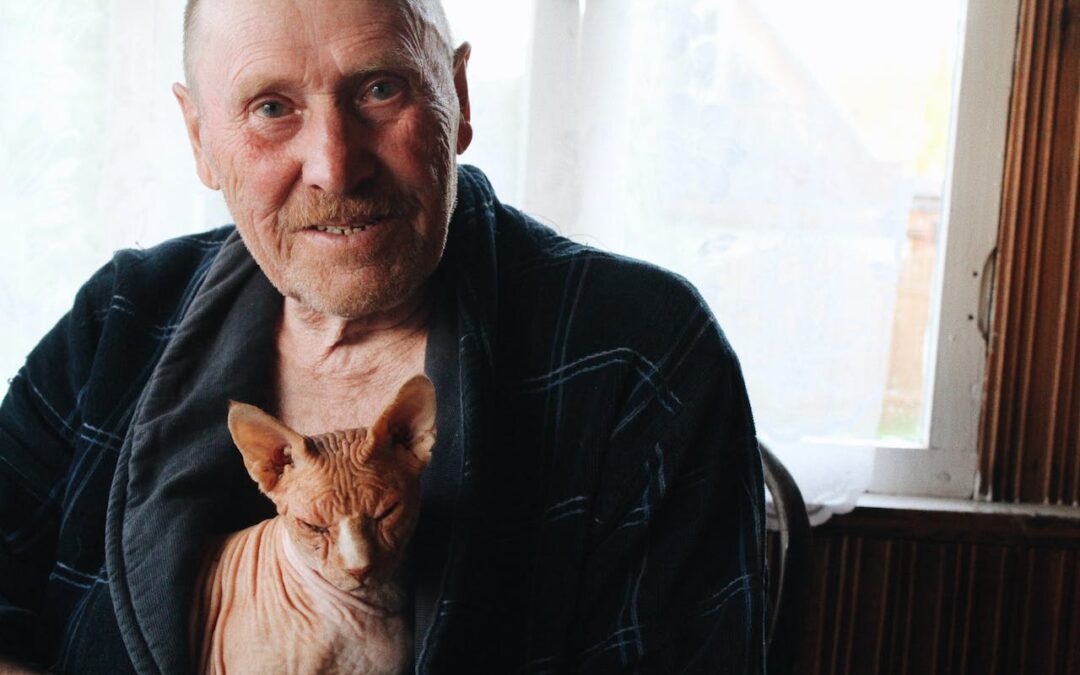“Animals are such agreeable friends – they ask no questions, they pass no criticisms.”
- George Eliot
Animals can enrich our lives in so many ways. At Aurrum, pet therapy is incorporated into our aged care lifestyle activities for everyone to enjoy. The benefits of pet therapy for dementia patients are also particularly notable.
What is pet therapy?
Pet therapy, also known as animal-assisted therapy, is a therapeutic approach that involves using animals, typically dogs but sometimes other animals like cats, rabbits, or horses, to provide comfort, support, and companionship to individuals in various healthcare, rehabilitation, or therapeutic settings. Trained animal handlers or therapists bring these animals into environments such as hospitals, nursing homes, schools, or mental health facilities to interact with individuals who may benefit from their presence.
Pet therapy for dementia residents aims to improve physical, emotional, and psychological well-being by fostering a positive connection between the animal and the person, which can reduce stress, anxiety, and depression, boost mood, and enhance overall quality of life. The therapy may involve activities like petting, walking, or simply spending time with the animals to achieve its therapeutic goals.
Benefits of pet therapy for people living with dementia
The positive impact of pet therapy for dementia residents is extensive:
- Reduces Anxiety and Agitation: Interacting with animals can help reduce feelings of anxiety and agitation in people living with dementia, promoting a sense of calm and relaxation.
- Improves Mood and Well-being: Spending time with animals has been shown to increase oxytocin levels, often referred to as the “love hormone,” which can improve mood and overall well-being. This ties in closely with the importance of sensory engagement for improved mood.
- Promotes Social Interaction: Pet therapy for the elderly encourages residents to engage in social interactions, as they share their experiences and feelings with fellow residents and staff members.
- Encourages Physical Activity: Engaging with animals often involves physical activities such as walking or petting, which can enhance residents’ mobility and physical health.
- Stimulates Cognitive Function: The sensory experience of interacting with animals can stimulate cognitive function and provide mental stimulation.
- Provides Companionship and Comfort: The presence of animals offers companionship and emotional comfort to residents, reducing feelings of loneliness and isolation.
- Can Help with Reminiscence: Pet therapy in aged care may trigger memories and provide opportunities for reminiscence, in a similar way that bringing something to your new aged care home does.
- Can Help with Behavioural Issues: Pet therapy can contribute to managing and reducing challenging behaviours often associated with dementia, such as aggression or restlessness.
How pet therapy works in an aged care home
With pet therapy in aged care, an animal handler brings in a gentle and well-behaved animal – most often a dog – into the care home where residents can have guided interactions with the animal. This might include brushing, walking or petting the pet. Spending time with animals has been found to boost people’s oxytocin levels and reduce stress and anxiety, so pet therapy is a natural mood booster. It’s always a great day and a lot of fun when our furry friends come visiting.
Where pet therapy isn’t possible, Paro therapy is
People living with dementia, particularly in later stages, may at times behave in ways that might be physically or verbally aggressive. In situations where interactions with a live animal might not be suited, the resident can spend time with PARO the social robotic seal. PARO is around the size and weight of a cat, very soft and fluffy, and responds to touch, sound, heat, light and movement. It can even recognise its own name when called. It’s said that interacting with PARO can help to reduce anxiety and agitation, and we see firsthand how residents love sitting with PARO in their lap as they talk and interact with the little seal pup.
Unlocking the healing power of pet therapy
At Aurrum, we understand why holistic aged care is so essential, which is why we value pet therapy for residents living with dementia so much. Ultimately, pet therapy is a remarkable and holistic approach to improving the lives of individuals, particularly those living with dementia, in aged care facilities. The positive impact of animal interactions on emotional, social, and cognitive well-being cannot be understated. Whether through the presence of furry companions or innovative alternatives like PARO therapy, these interventions offer a path to comfort, joy, and meaningful connections for residents.
You can explore more information on Aurrum’s lifestyle programs to see the wide range of aged care activities and ideas available to care home residents. We’re always adding interesting, beneficial and tailored activities to support physical, mental and emotional wellbeing.
